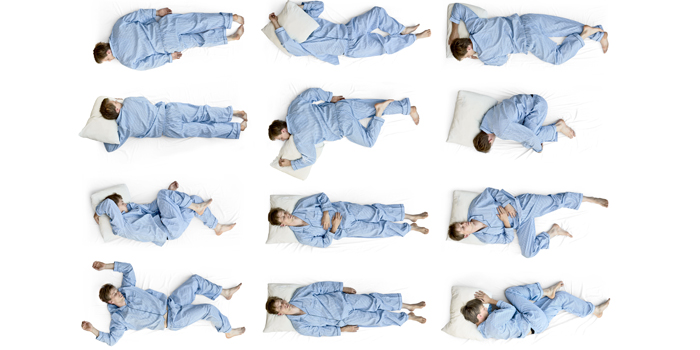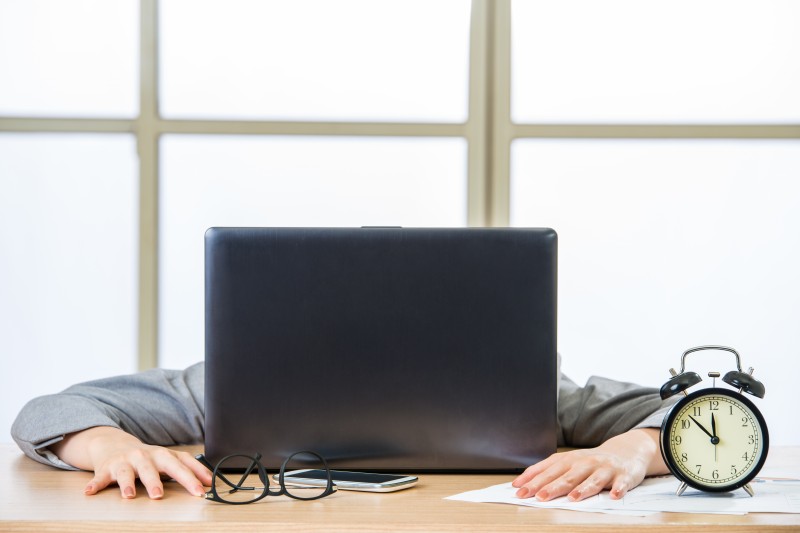
One of the first things we are taught as novice bodybuilders, powerlifters, or athletes is the importance of recovery. Number one in that category is sleep. In a society of sleep-deprived individuals, this is now more important than ever. Let’s be real, though. Many of us are very busy and sleeping enough is easier said than done — not to mention the fact that a lot of people have poor sleep quality when they do sleep.
What are the consequences of sleep loss? Are they overstated or more serious than most make them out to be?
RELATED: Shiftwork, Sleep Deprivation, and Training: How to Overcome A Less Than Ideal Schedule
When it comes to deprivation, the consequences are very real. Deprivation can happen a lot easier than most realize, too. Let’s go over some of the major issues that research points to.
- Impacted cholesterol metabolism and inflammation
- Insulin resistance
- Lessoned satiety
- Increased mortality rate
- Cortisol disruption and disruption of entire sleep/wake cycle
- Decreased energy expenditure
- Worsened productivity during the day
- Increased risk of numerous diseases
- Disruption of most diurnal hormone cycles
It’s pretty well established that sleep loss can shorten lifespan for most people.
Sleep Environment
There are more variables to consider when it comes to sleep than most realize. The main thing I am asked is what supplements someone can take to sleep. While certain supplements may be relevant in certain situations, there is more to the equation.
Sleep environment is one of the most important—if not the most important—factor when it comes to sleep. Let’s touch on the external environment needed for improving sleep time and quality. Some things that are typically helpful to just about anyone are as follows.
- Sleep in a dark/black room. The less light in the room the better. If you have a plug-in alarm clock, turn it away from the bed. Blackout curtains are a must as well! Keep those pesky cell phones off or facing the floor.
- Ditch the caffeine before bed, or even in the afternoon for that matter. In humans, caffeine is metabolized in the liver by the CYP1A2 isozyme. How quickly this happens depends on the person, but most can expect the half-life to be five to six hours, and the active life much longer than that. Even if you are able to fall asleep with caffeine in the evening, it will still be present in your system for quite a long time. Your sleep quality will be subpar when caffeine is still present since your nervous system will be disrupted.
- No bright screens or anything stimulating before bed. This lowers melatonin production, other chemical processes, and circadian rhythm. This can impact the quality of sleep greatly. With modern technology these days, this tends to be an issue. I see huge improvements with this variable being fixed. In some cases, some people will need to use things like cell phones or computers in the evening for work. In these instances, I suggest blue light filtering glasses (easy to find on Amazon) and a light-filtering app on your device. You can find these for both computers and cell phones. Current literature actually shows disruption in melatonin and cortisol levels when exposed to blue light before bed.
- Rid your environment of background noise. I have been sleeping with earplugs for a while now and love it. I was somewhat apprehensive at first because I thought my mind would race with the silence. It was actually quite the opposite, as they help keep me asleep at night and sleep deeper. The soft wax/gel kind seems to fit best. Beats a fan in the background, in my opinion. I often suggest these to clients and they find the same results.
- Wind down before bed. Eating your last meal of the day in pretty low to no light before bed will prove to be very relaxing and help stimulate the natural sleep process by improving melatonin and GABA production, as well as serotonin production from the meal. Some may find that really large meals before bed disrupts sleep, though, so this may take some experimentation. It’s quite productive to relax for a good 30 minutes before bed, in either case.
- Practice soft belly breathing after lying down in bed if you have problems with racing thoughts. If you happen to have a friend that is a monk, they can show you the technique. Otherwise, Google will suffice. It’s quite simple, though! You simply want to breathe in as far as possible then release your stomach as far as possible in a slow fashion. This technique will activate the vagus nerve, which is a large part of what controls the relaxation response of the nervous system.
- Cool temperatures are best for the bedroom.
- Invest in good bedding.
- Get rid of clutter in your room. Making your bed can even help!
- Soothing essential oils may help produce a calming effect.
- Consistency in sleep and wake time is also an important factor. Though, not environment related, it should be noted. Frequent disruptions in the cycle can cause an issue with sleep/wake cycle. The body adapts to certain times for sleeping and waking. It’s no fluke that you may often get tired around the same time most days.
This is a big reason shift work can be really negative. It’s unavoidable for some folks, so if this is you, make sure you take advantage of napping. See below!
Napping: Short or long, it's beneficial.
Napping tends to be a luxury for a lot of people. However, what if I told you even 10 minutes is beneficial? Naps of various lengths may produce slightly different effects, but even short naps of 10 minutes are beneficial. Something as simple as a 10-minute cat nap in your car on your lunch break, after the gym, or while you are hiding in the bathroom at work can make a difference.
Shorter naps in the 10 to 20-minute range tend to provide quick cognitive boosts to keep brainpower and sharpness high as the day goes on. This is a result of a process called “Process O.”
Longer naps going into and past the 30-minute range can be beneficial, but also negative at times. Shorter naps don’t allow you to fall into a deep sleep or complete a sleep cycle. Napping too long, however, may make you feel very groggy afterward and disrupt sleep at night. Much of this will depend on how much sleep you are getting at night and when you take a nap relative to going to bed at night.
Most research is in favor of shorter naps. Take advantage of spare minutes anytime you have them and get a little shut-eye.
Supplements and Where They Fit into the Equation
As stated initially, there are supplements that help with sleep, but they all have different uses depending on the situation. Too often, folks just shovel down anything that is said to help with sleep, without really knowing when and how to use it. Sleep aid supplements can help with a few major variables: relaxation, falling asleep, staying asleep, and quality of sleep. Let’s go over some of the more useful supplements!
L-Theanine
This is a pretty versatile supplement because it can actually be used for anxiety during the day as well. However, dosing at night will usually be slightly higher to produce a deeper relaxation effect. Theanine helps increase GABA production and provides a very relaxing effect that can help ease your mind before bed. It crosses the blood brain barrier much better than other supplements that may increase GABA, like supplementing with GABA itself (does not cross well).
Dosing for L-Theanine varies person to person, but 200 milligrams 30 minutes before bed is usually a good place to start. This needs to be taken WITHOUT food.
Melatonin
Probably one of the most commonly used sleep supplements, melatonin is hit or miss for most people. Melatonin tends to work well for those that may have depleted levels, for whatever reason. Above, I mentioned that normal melatonin production can be interrupted by blue light exposure before bed. Supplementing with melatonin in that instance seems to be beneficial. It also proves beneficial for those that have constantly changing sleep cycles that may disrupt normal production. For example, shift workers may try using melatonin to regulate sleep cycles. Melatonin also has some other interesting benefits, such as helping stimulate beige fat that can burn calories instead of storing them.
Dosing both in practice and in literature varies quite a bit. However, starting low in the one to the three-milligram range is a good idea. Doses may be pushed higher, into the five to 10-milligram range in some cases. It can be taken 30-60 minutes before bedtime.
5HTP
Another big player in relaxation and sleep is the hormone serotonin. Have you ever felt sleepy from a large carbohydrate or high-calorie meal? This was likely due largely in part to a dump of serotonin from the meal. Supplement wise, 5HTP is an easy way to increase serotonin levels. It can also be a great supplement for those that may suffer from serotonin imbalances and would otherwise need SSRI type anti-depressants. This is not a supplement that I suggest to everyone, as it’s a little more specific than some of the others. I tend to notice that the folks that benefit most from 5HTP also have other issues with mood, anxiety, etc. This may be some insight that they are deficient in serotonin to some extent.
Dosing for sleep purposes can start at 200 milligrams 30 minutes before bedtime. 300 milligrams can be used if needed to produce the desired effect. Some may even notice benefits at a low dose of 100 milligrams. For general mood enhancement effects during the day, 100 milligrams three time per day can be used. However, keep in mind it will still have similar effects in terms of making you a bit sleepy.
Valerian Root
Known for its sedative and anxiety relief effects, valerian root is another worthwhile addition to this list. It largely interacts with GABA receptors, which is where much of its effects come from. In studies, it has been shown to have promising effects on sleep quality and anxiety relief.
Dosing is in the 300-600 milligram range when using the herbal extract. As always, start on the lower end. Doses can be consumed 30-60 minutes before bedtime.
Magnesium
Magnesium is a vastly versatile mineral that just so happens to help with sleep as well! On top of acting on GABA receptors, magnesium also acts on NMDA receptors to add another element to its sleep properties. It comes in many forms and each form has a different absorption capability and in turn slightly different effects. For sleep, it’s a good idea to stay away from forms that may have laxative effects. Sticking to glycinate, taurtate, or even citrate is a safe bet. It will have a great effect on folks that are deficient as well, which seems to be moderately common.
Dosing can start around 200 milligrams, 30-60 minutes before bedtime. Going up to 400 milligrams is perfectly fine if needed. With a quality form of magnesium, you shouldn’t need much more than that.
Chamomile
This ingredient may be slightly underrated. It has additional benefits outside of sleep, which always makes something good a little better. In terms of sleep, it works similarly to benzo drugs like Xanax. Though it’s not as strong, it’s a great alternative. It also has some great anti-inflammatory and anti-bacterial effects inside the body. I would add this to the list of “calming” ingredients. It may also help control levels of ACTH (a stress hormone) in the brain.
Dosing can be in the 200-500 milligram range of a quality extract. Like most of the other items on the supplement list, dosing should be shortly before you want the desired effects.
There are plenty of other additions that could be made here. However, these are some of the more common and effective options. In general, “sleep” supplements will act on GABA, serotonin, NMDA, and possibly affect the adrenals. Many of the supplements are somewhat overlapping in what they act on in the body, hence not listing the kitchen sink here.
MORE: Sleep Science: Hitting the Snooze Bar
I would stay away from antihistamines (like Benadryl and Unisom) as sleeps aids. If it’s a matter of sleeping or not sleeping, then one or two nights is one thing. At a point, though, it’s likely there will be a histamine rebound — and from what I’ve observed, it’s pretty quick. Histamine is produced by the CNS. Use of antihistamines for sleep can disrupt REM sleep. While you may fall asleep, quality will not be great — not to mention the disruption in normal adrenal function.
Harsher prescription sleep aids come with a whole new set of potential issues as well. I won’t dive into those but, in general, you can expect natural sleep patterns to be disrupted and dependency is common.
Other Considerations
- If you suspect you may have sleep apnea then it is worth getting checked out. Correcting sleep apnea can make a substantial impact on your sleep.
- Sometimes our schedules don’t allow long periods of sleep. Getting your sleep in in chunks is still worthwhile if you cannot get it in consecutively.
- Correcting environmental issues is always number one, over taking a supplement to sleep.
- Don’t be part of #teamnosleep. You WILL be more productive in the long run, but sleep more hours and be energetic and focused during a shorter waking period.
References
- Benson, D. (2013, October 7). Trouble sleeping? Experts say skip antihistamines. Retrieved from https://www.bcm.edu/news/sleep-disorders/experts-warn-against-antihistmaines-sleep-aid
- Effects of smartphone use with and without blue light at night in healthy adults: A randomized, double-blind, crossover, placebo-controlled comparison. (2016, December 12). Retrieved from https://www.ncbi.nlm.nih.gov/pubmed/28017916
- Melatonin helps control weight gain as it stimulates the appearance of ‘beige fat’ that can burn calories instead of storing them, study suggests. (2013, September 25). Retrieved from https://www.sciencedaily.com/releases/2013/09/130925091745.htm
- Prolonged sleep restriction induces changes in pathways involved in cholesterol metabolism and inflammatory responses. (2016, April 22). Retrieved from https://www.ncbi.nlm.nih.gov/pubmed/27102866
- The effect of magnesium supplementation on primary insomnia in elderly: A double-blind placebo-controlled clinical trial. (2012, December 17). Retrieved from https://www.ncbi.nlm.nih.gov/pubmed/23853635
- The Metabolic Consequences of Sleep Deprivation. (2008, June 1). Retrieved from https://www.ncbi.nlm.nih.gov/pmc/articles/PMC1991337/
- Trouble sleeping? Experts say skip antihistamines. (2013, October 7). Retrieved from https://www.bcm.edu/news/sleep-disorders/experts-warn-against-antihistmaines-sleep-aid
- Valerian. (15, April 2003). Retrieved from http://www.aafp.org/afp/2003/0415/p1755.html











